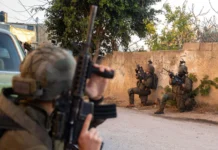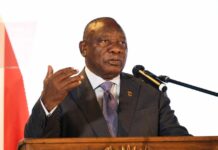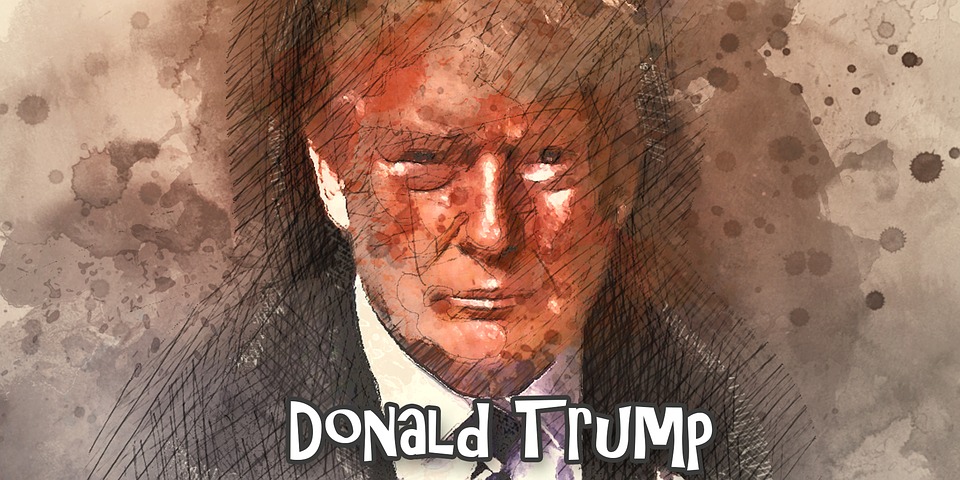“Professor Louis René Beres – Ph.D., Princeton, 1971 – was Chair of Project Daniel in Israel – for Prime Minister Sharon.”
“I am become Death, the shatterer of worlds.”
Bhagavad Gita, cited by American nuclear physicist J. Robert Oppenheimer at Alamogordo, New Mexico, on July 16, 1945
US President Donald Trump, plainly over his depth in strategic matters, could soon be faced with unprecedented challenges to American national security. In this connection, the most expectedly daunting threats will concern some forms or other of nuclear strategy and nuclear war.[i] Will he be ready for such complex challenges?
Can anyone reasonably expect that this president will be up to coping capably with such bewildering expectations, either intellectually or emotionally?[2]
In all appropriate candor, Mr. Trump’s analytic and state-of-mind debilities continue to be deeply concerning. This informed apprehension becomes more noteworthy when his evident shortcomings are: (1) seen as intersecting and reinforcing;[3] (2) considered together with his persistently willing subservience to the Russian president in “Cold War II;[4] and (3) assessed within the proper statutory and Constitutional parameters of formal US nuclear command authority.[5]
In fairness, of course, these notably alarming personal shortcomings are not necessarily unique or distinctive to this particular American president. In principle, at least, at a more expressly generic level, they might also represent certain continuously complex qualities, issues about which I have been lecturing and publishing for almost half a century. If I might now be permitted to share some closely related insights, this might help us to better understand just how irremediably perilous the incoherent Trump presidency could rapidly become.
In essence, the cumulative security risks America currently faces as a nation are potentially immediate and prospectively existential. Most obvious, in this regard, is the stubbornly complex problem of North Korea. Here, inter alia, the president’s aimlessly indiscriminate confusion of belligerent rhetoric with actual power could only lead the United States further away from genuine national security. As to Mr. Trump’s repeated emphases on “pretended irrationality,” there is absolutely no evidence that such a so-called “strategy” could prove anything but perilous for the United States and also certain of its relevant allies.
To be sure, this President’s “bravado strategy” need not be convincing in any form or expression. Even as quixotic an adversary as Kim Jung Un can likely tell the critical difference between his American adversary’s real military capacity, and narrowly shallow bombast. In this regard, nothing remotely worthwhile can be accomplished by planning to hold a North Korea-style military parade inside the United States – Donald Trump’s expressed wish. To suggest otherwise, to wit, that any such Gilbert and Sullivan event could conceivably be purposeful for the United States or its allies, represents little more than the reductio ad absurdum of an already overwhelmed presidency.
The principal risks to US and allied security are tangible and multi-sided. These risks would be especially high during any foreseeable circumstances of competitive risk-taking with Kim Jung Un, that is, in identifiably deliberative moments when each side is energetically (and perhaps desperately) seeking “escalation dominance.” To add a blatantly valueless layer of competition at the purely circus level of military parades would merely distract from any still-remaining hopes that President Trump’s generals are prudent, serious and capable.
Once again, it is high time for candor. We live at an historical moment when certain seemingly miniscule escalatory misjudgments in Washington and/or Pyongyang could create staggering and even irreversible harms around the globe. To suitably “moderate” this perilous moment, Mr. Trump must first understand that world politics (1) is never analogous to narrower worlds of glittering casino development or commercial real estate; and authentic national security (2) is not convincingly enhanced by linguistic contrivance or by any allegedly artful deal making.
Back in the nineteenth century, Friedrich Nietzsche already had it right. Warned the prescient philosopher in Zarathustra: “One must never seek the Higher Man in the marketplace.” (Today, of course, we would want to make this into a more properly gender-neutral “Higher Person”).
More urgently than on any other specific security hazard, President Trump must make himself better informed about all potentially pertinent nuclear conflict scenarios in our anarchic[6] or “Hobbesian” world system.[7] Correspondingly, both the Congress and the citizenry must keep a much closer and more honest (non-partisan) watch on Mr. Trump’s problematic willingness to take nuclear war with sufficient seriousness.[8] Among other things, he will need to be reminded that no scientifically accurate estimates of nuclear war likelihood are logically possible.[9] This is because, in science, true probabilities must always be based upon a determinable frequency of pertinent past events, and because there has never been a nuclear war event.
Never.
The American atomic bombings of Hiroshima and Nagasaki in August 1945 “don’t count” as nuclear war examples. These were singular episodes of nuclear attack upon enemy civilian populations in an otherwise purely conventional war. It follows that in any still-upcoming nuclear crisis situations, a casually dismissive presidential stance on expected outcomes could produce unexpected or even intolerable results.
Quickly.
I have been studying nuclear warfare issues for a long time. After four years at Princeton in the late 1960s, long an intellectual center of American nuclear history and thought, I first began to think about adding a modest personal contribution to the growing literatures of first-generation nuclear thinkers. Accordingly, already by the mid- 1970s, I was busily preparing an original manuscript on U.S. nuclear strategy, and on certain corollary risks of nuclear war.[10]
At that time, moreover, I was interested in very specific questions of presidential authority to order the use of American nuclear weapons.
Among other things, I soon learned that reliable safeguards had been carefully built into all American nuclear command/control decisions, but also that these reassuring safeguards would never apply at the presidential level. To a young strategic scholar, this ironic disjunction didn’t make any obvious sense, especially in a world where national leadership irrationality was assuredly not without precedent.[11] For needed clarifications, I reached out to retired General Maxwell D. Taylor, a distinguished former Chairman of the Joint Chiefs of Staff.
In rapid response to my query, General Taylor sent me a detailed handwritten reply. Dated 14 March 1976, the General’s informed letter concluded presciently: “As to those dangers arising from an irrational American president, the only protection is not to elect one.”
Until now, I had never really given any extended thought to this truthful but distressing response. Instead, I had assumed that somehow “the system” would somehow always operate precisely according to plan. Today, as the discordant presidency of Donald Trump coincides with a North Korean nuclear standoff and continued Iranian nuclearization, General Taylor’s 1976 warning takes on even greater and more urgent meaning. Now, however reluctantly, Americans must realistically assume that if President Trump were ever to exhibit profound emotional instability, irrationality, or patently delusionary behavior, he could nonetheless order the use of American nuclear weapons, and do so without any calculable expectations of any official “disobedience.”
At this point, a distressingly core question should come immediately to mind. What should be done by the National Command Authority (Secretary of Defense, Chairman of the Joint Chiefs of Staff, National Security Advisor, and presumptively several others) if it should ever decide to oppose a determinably inappropriate presidential order to launch American nuclear weapons? Could the National Command Authority reliably “save the day” by acting in an impromptu or creatively ad hoc fashion? Or should there already be in place aptly credible and effective statutory measures to (1) meaningfully assess the ordering president’s reason and judgment; and (2) promptly countermand any wrongful order?
In law, Article 1 (Congressional) war-declaring expectations of the Constitution notwithstanding, any presidential order to use nuclear weapons, whether issued by an apparently irrational president, or by an otherwise incapacitated one, should be obeyed. To do otherwise, in such dire circumstances, would be prima facie illegal; that is, impermissible on its face. Additionally, President Trump could likely order the first use of American nuclear weapons even if the US were not under a specifically nuclear attack.
Here, too, a further strategic and legal distinction must be made between first use and first strike. There exists an elementary but vitally important difference, significantly one that candidate Donald Trump had completely failed to understand during his 2016 campaign debates. Inter alia, this core difference has to do with distinguishing essential self-defense from aggression.[12]
Aggression, of course, is a codified crime under international law.[13] It is, therefore, reciprocally prohibited by pertinent US law.
Where should American nuclear policy go from here? To begin, a coherent and comprehensive answer will need to be prepared for the following very basic question: If faced with any presidential order to use nuclear weapons, and not offered sufficiently appropriate corroborative evidence of any actually impending existential threat, would the National Command Authority: (1) be willing to disobey?, and (2) be capable of enforcing such seemingly well-founded expressions of authoritative disobedience?
In such unprecedented nuclear crisis circumstances, all relevant decisions could plausibly have to be made in a compressively time-urgent context. Such excruciatingly tight chronological constraints could quickly become overriding.
The only time for Americans to prepare for such vital national security questions is now. This is the case whether or not President Donald Trump should incrementally prove himself to be a more-or-less stable and capable crisis decision-maker. Though we might all draw a huge sigh of relief if the ongoing North Korean nuclear crisis were to subside, there will inevitably arise other similar or even more portentous atomic emergencies.[14] To respond purposefully, as needed, the US and certain of its allies will then require more than a purely stream-of-consciousness or seat-of-the-pants prescription from the White House.
Much more.
There is one last but still important point. Whether it is in reference to a proposed military intervention or to another considered military action, the American president is bound not only by US law, but also by international law. The latter, which is discoverable, inter alia, in various customary norms as well as in bilateral and multilateral treaties, is always an integral part of American law.[15] Such “incorporation” is most prominently expressed at Article 6 of the US Constitution (the “Supremacy Clause”), and also at various major US Supreme Court decisions.[16]
Looking ahead, Donald Trump’s policies for dealing with adversarial nuclear threats must always remain consistent with American military requirements and with corollary jurisprudential obligations. Striking the necessary and optimal balance between both coinciding imperatives will inevitably confront this ill-prepared president with very stark intellectual and ethical dilemmas. For now, at least, it does not appear at all likely that he will be able to satisfactorily meet such bewildering and overlapping challenges.[17]
Not at all.
So what happens then?[18] It is a question that ought to be answered not only in Washington and New York, but also in London, Paris, and Jerusalem.
[1] In this connection, we may certainly consider further nuclear proliferation together with the insights of English political philosopher, Thomas Hobbes. According to this important seventeenth-century thinker, whose work was well-known to Thomas Jefferson, a “state of nature” is a condition of anarchy where “the weakest has strength enough to kill the strongest…” (Leviathan, Chapter Xlll). In expressly Hobbesian terms, therefore, nuclear weapons spread would bring the international system into an ever closer and more dangerous alignment with that condition of primal anarchy suffered by individual human beings in nature.
[2] “Everything is simple in war,” warns Carl von Clausewitz in On War (Vom Kriege), “but even the simplest thing is difficult.”
[3] These traits may form an intricately interconnected network. Here, assessments of any related risks should include a patient search for synergies, and also for potential cascades of failures that could sometimes represent one markedly serious iteration of synergy. Other risk properties that will warrant careful assessment by US defense specialists within this particular genre could include contagion potential and persistence.
[4] In orthodox political science terms, positing the expansion of “Cold War II” means expecting that the world system is becoming increasingly bipolar. For early writings, by this author, on the global security implications of just such an expanding bipolarity, see: Louis René Beres, “Bipolarity, Multipolarity, and the Reliability of Alliance Commitments,” Western Political Quarterly, Vol. 25, No.4., December 1972, pp. 702-710; Louis René Beres, “Bipolarity, Multipolarity, and the Tragedy of the Commons,” Western Political Quarterly, Vol. 26, No.4., December 1973, pp, 649-658; and Louis René Beres, “Guerillas, Terrorists, and Polarity: New Structural Models of World Politics,” Western Political Quarterly, Vol. 27, No.4., December 1974, pp. 624-636.
[5] See, by this author: https://thebulletin.org/what-if-you-don%E2%80%99t-trust-judgment-president-whose-finger-over-nuclear-button9794
[6] With anarchy, international law remains a “vigilante” system, or, in other words, “Westphalian.” This latter reference is to the Peace Of Westphalia (1648), which concluded the Thirty Years War, and created the now still-existing decentralized, or self-help, state system. See: Treaty of Peace of Munster, Oct. 1648, 1 Consol. T.S. 271; and Treaty of Peace of Osnabruck, Oct. 1648, 1., Consol. T.S. 119, Together, these two treaties comprise the Peace of Westphalia.
[7] The chaotic condition of Westphalian global anarchy stands in contrast to the classical jurisprudential assumption of solidarity between all states in a presumably common struggle against aggression and terrorism. Such a peremptory expectation (known formally in international law as a jus cogens assumption), is already mentioned in Justinian, Corpus Juris Civilis (533 C.E.); Hugo Grotius, 2 De Jure Belli Ac Pacis Libri Tres, Ch. 20 (Francis W. Kesey, tr., Clarendon Press, 1925)(1690); and Emmerich De Vattel, 1 Le Droit Des Gens, Ch. 19 (1758).
[8] The U.S. has been modernizing its nuclear arsenal primarily by upgrading existing weapon systems, rather than by deploying altogether new types of such weapons. The ICBM force is in a final phase of a decade-long $8 billion modernization program. Beginning in 2017, the U.S. Navy began to deploy a modified version of the trident II D-5 submarine-launched ballistic missile (SLBM). The U.S. Air Force has already begun Life Extension Programs for its air-launched cruise missile, as well as for the B-2 and B-52 bombers. In any event, prima facie, U.S. nuclear modernization efforts and plans undercut the publicly-stated U.S. goal of achieving “bold reductions” in Russian and U.S. nonstrategic nuclear weapons in Europe. For more on these complex and inter-penetrating “Cold War II” strategic issues, see: Hans M. Kristensen, “Nuclear Weapons Modernization a Threat to the NPT?” Arms Control Today, Arms Control Association, September 2015.
[9] For an early look at these problematic estimations, see: Anatol Rapoport, Strategy and Conscience (New York: Schocken Books, 1964), 323 pp.
[10] This book was subsequently published in 1980 by the University of Chicago Press: Louis René Beres, Apocalypse: Nuclear Catastrophe in World Politics. http://www.amazon.com/Apocalypse-Nuclear-Catastrophe-World-Politics/dp/0226043606
[11] Says Sigmund Freud: “Fools, visionaries, sufferers from delusions, neurotics and lunatics have played great roles at all times in the history of mankind….Usually, they have wreaked havoc.”
[12] Punishment of aggression is a firm and longstanding expectation of international criminal law. The peremptory principle of Nullum Crimen sine poena, “No crime without a punishment,” has its origins in the Code of Hammurabi (c. 1728 – 1686 B.C.E.); the Laws of Eshnunna (c. 2000 B.C.E.); the even earlier Code of Ur-Nammu (c. 2100 B.C.E.) and the law of exact retaliation, or Lex Talionis, presented in three separate passages of the Jewish Torah.
[13] Since World War II, aggression has typically been defined as a military attack, not justified by international law, when directed against the territory of another state. The question of defining aggression first acquired legal significance with the Draft Treaty of Mutual Assistance of 1923. One year later, the Geneva Protocol of 1924 provided that any state that failed to comply with the obligation to employ procedures of peaceful settlement in the Protocol or the Covenant was an aggressor. Much later, an authoritative definition of aggression was adopted without vote by the UN General Assembly on December 14, 1974.
[14] See, generally, Seneca, 1st Century AD/CE: “We are mad, not only individuals, but nations also. We restrain manslaughter and isolated murders, but what of war, and the so-called glory of killing whole peoples? ….Man, the gentlest of animals, is not ashamed to glory in blood-shedding, and to wage war when even the beasts are living in peace together.” (Letters, 95).
[15] Note further the jus cogens principle that international law is ultimately deducible from natural law. In this connection, according to Blackstone, each state is always expected “to aid and enforce the law of nations, as part of the common law, by inflicting an adequate punishment upon offenses against that universal law….” See: 2 William Blackstone, Commentaries on the Laws of England, Book 4, “Of Public Wrongs.” Lest anyone ask about the significance of Blackstone for current US national security policies, one need only point out that Commentaries are an original and core foundation of the laws of the United States.
[16] See especially The Paquette Habana, 175 US 677, 700 (1900); and Tel-Oren v. Libyan Arab Republic, 726, F. 2d, 774, 781, 788 (D.C. Cir. 1984) per curiam.
[17] “The enemy,” noted German philosopher Karl Jaspers, in a more generic sense, “is the unphilosophical spirit which knows nothing and wants to know nothing of truth.” See: Reason and Anti-Reason in our Time, 1971, p. 66.
[18] Ultimately, this brings to mind the closing query of Agamemnon in The Oresteia by Aeschylus: “Where will it end? When will it all be lulled back into sleep, and cease, the bloody hatreds, the destruction”?


























